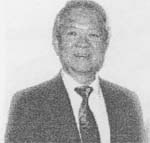
Art Shibayama
Isamu Carlos Arturo "Art"Shibayama is the recipient of the 2002 Fighting Spirit Award by the Nikkei for Civil Rights & Redress (NCRR). NCRR selected Shibayama for his activism and fighting spirit in seeking justice for Japanese Latin Americans and his ongoing struggle to receive reparations from the U.S. government through his lawsuit, Shibayama v. Reno (USA).
During World War ll, the United States government kidnapped over 2,200 Japanese Latin men, women and children to be used in a hostage exchange program with Japan. Shibayama and his family, natives of Lima, Peru, were forcibly removed from Peru in 1944 and imprisoned at Crystal City, Texas for two and a half years. Once an affluent businessman, Shibayama's father struggled to support his family of eight children through a variety of odd jobs after they were released from camp.The family traveled from Texas to the Seabrook Farm in New Jersey and then to Chicago to find suitable work. The elder Shibayama passed away in 1976.
By 1993, most eligible Japanese Americans had been issued an apology and reparations from the government through the passage of the Civil Liberties Act of 1988. However, many Japanese Latin Americans were being denied the $20,000 because the legislation provided compensation for only U.S. citizens and permanent residents. The Japanese Latin Americans had their passports taken from them before their imprisonment in the U.S. and now were being denied redress for their illegal alien status during the War.
Shibayama and his brothers were denied redress on this technicality. Although Shibayama served in the U.S. Army from 1952-54, he did not become a U.S. citizen until 1970. In the mid 1990's, he joined the Campaign for Justice: Redress Now for Japanese Latin American! (CFJ) and participated in several lobbying delegations to Washington D.C.
In 1996, the CFJ and lawyers helped a small group of Japanese Latin Americans file a lawsuit against the U.S. government to win reparations. The offer of an out-of-court settlement in 1998 was accepted even though only $5,000 was provided for each surviving former internee. Shibayama and his brothers, Kenichi Javier Shibayama and Takeshi Jorge Shibayama, both of Chicago, refused the settlement along with 14 other former internees. These "opt-outers" believed the settlement was not sufficient given the larger amount given to Japanese Americans. The Shibayama brothers' case remains pending at this time